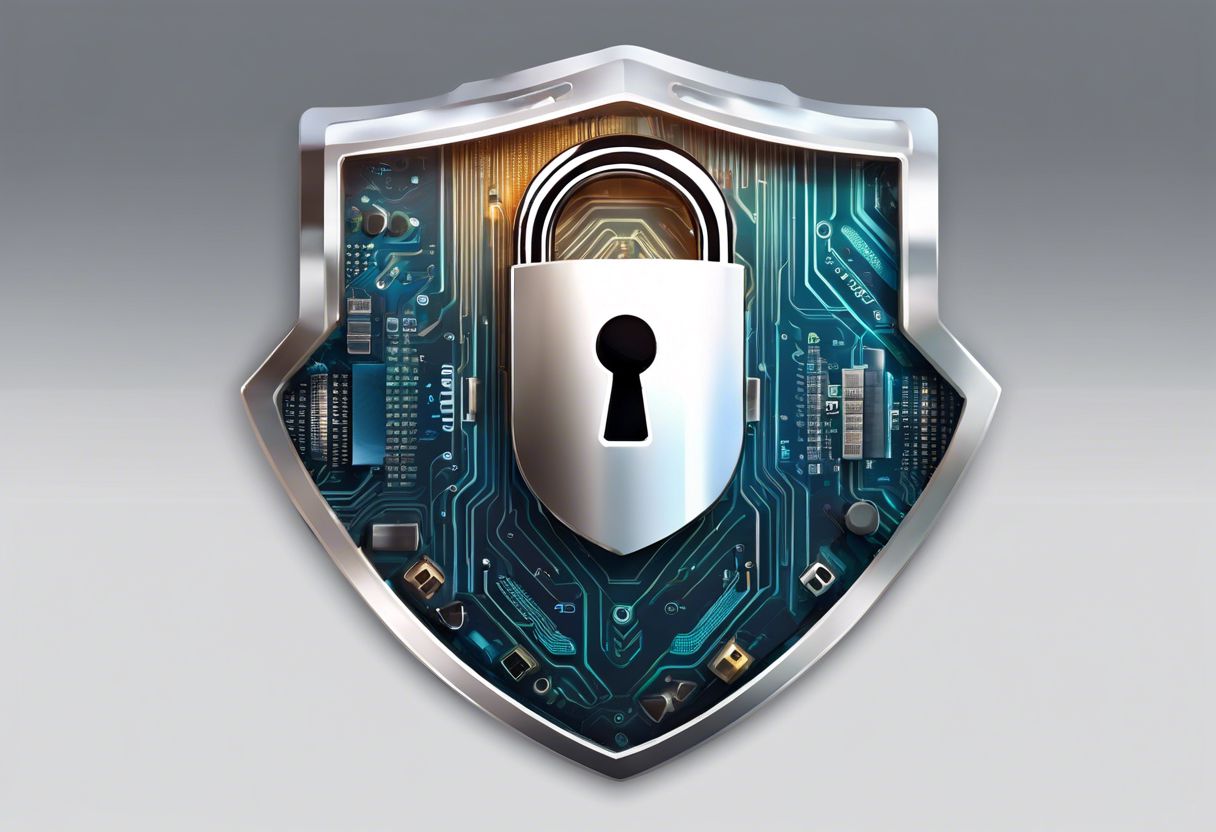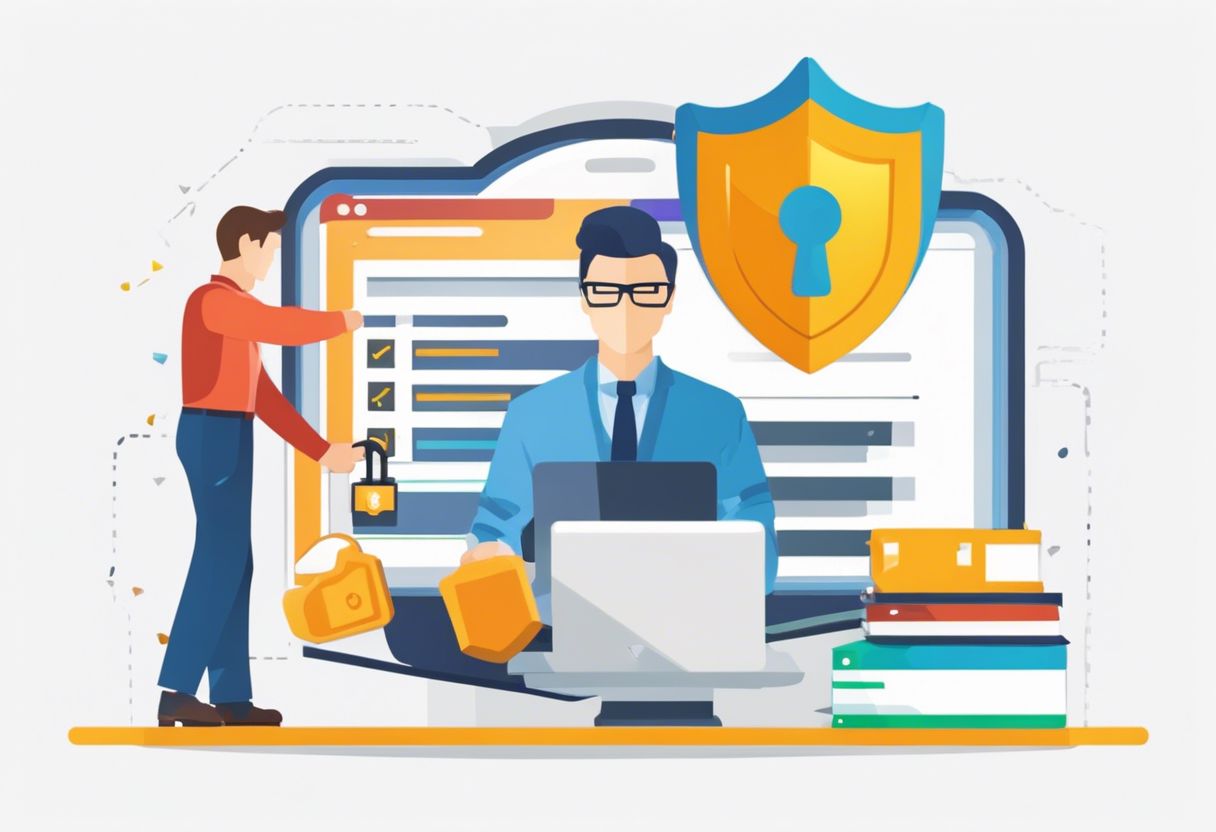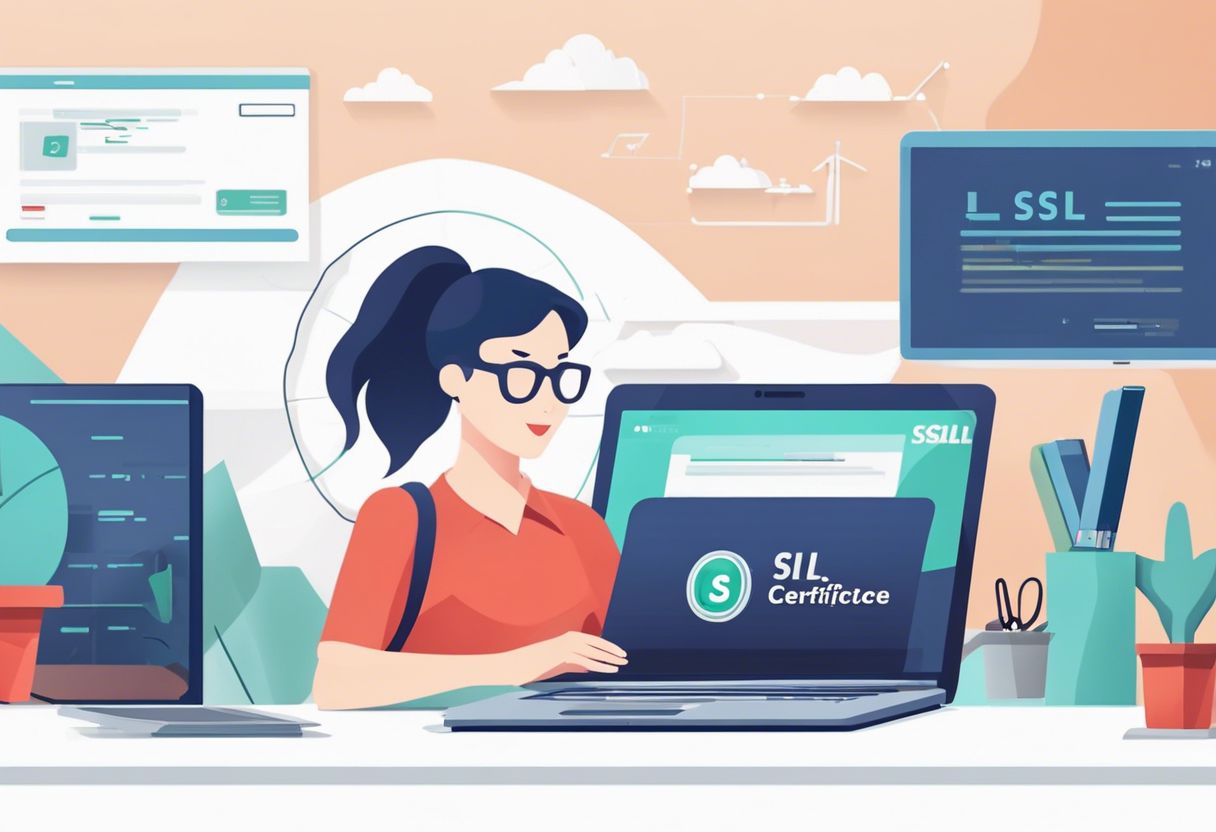SSL Secure: Building Trust With Essential Website Security

Hey there! Let’s talk about SSL security. This is like a secret code that keeps information safe when you visit websites. Imagine you’re sending a secret letter and you don’t want anyone else to read it—SSL is like the special lock on your mailbox.
Websites use something called SSL certificates to make sure no one can sneak a peek at what we’re doing online, whether we’re shopping or just chatting with friends. There are three kinds: DV, OV, and EV.
Each kind checks who owns the website in different ways.
Using SSL makes people trust a website more because they know their information is locked up tight. It’s also great because it stops hackers from stealing data as it travels across the internet.
If a website doesn’t have SSL, it’s not just easier for bad guys to attack; people visiting might not trust the site and Google might not show it as much in search results.
So if we own a business and have a website, getting an SSL certificate is key. We pick the right type, buy it from somewhere reliable like GoDaddy or our web host, and then set it up on our site.
Having this digital security guard helps everyone feel better visiting our site – like knowing there’s always someone watching over their shoulder keeping them safe online. Now let’s find out how to do this ourselves!
Understanding SSL Certificates
 SSL certificates play a crucial role in website security by encrypting data and authenticating the identity of the website. There are different types of SSL certificates, including DV, OV, and EV, each with varying levels of validation and trustworthiness.
SSL certificates play a crucial role in website security by encrypting data and authenticating the identity of the website. There are different types of SSL certificates, including DV, OV, and EV, each with varying levels of validation and trustworthiness.
The role of SSL in website security
 SSL stands for Secure Sockets Layer. It’s like a strong lock on your front door, but for your website. When visitors come to our site, SSL keeps their information safe. This is very important because we want them to trust us.
SSL stands for Secure Sockets Layer. It’s like a strong lock on your front door, but for your website. When visitors come to our site, SSL keeps their information safe. This is very important because we want them to trust us.
Imagine sending secret messages that only you and the person you’re talking to can understand – that’s what SSL does with data.
We use SSL certificates because they turn sensitive details into codes that hackers can’t easily read. These codes protect things like credit card numbers and passwords when people buy stuff or log in on our site.
So if anyone tries to grab this data while it’s moving from one place to another, all they see is a mix of random letters and numbers.
Having an SSL also shows everyone we care about privacy and security. It puts a padlock icon next to our web address in their browser, telling them it’s okay to share personal stuff with us.
We make sure no one else can pretend to be our website because the SSL checks who we are before giving out the certificate – kind of like checking ID at a club entrance.
Types of SSL certificates: DV, OV, EV

Understanding the role of SSL in fortifying our websites, we now turn our attention to the various types of SSL certificates – each designed to cater to different levels of security needs and validation rigor. These certificates are vital in establishing secure connections and manifest our commitment to safeguarding user data. Let’s examine the distinctions between Domain Validated (DV), Organization Validated (OV), and Extended Validated (EV) certificates, and how they contribute to a robust security posture.
| Type of SSL Certificate | Validation Level | Security Level | Best For |
|---|---|---|---|
| Domain Validated (DV) | Basic – Domain ownership | Standard encryption | Small websites and blogs |
| Organization Validated (OV) | Moderate – Organization identity | Enhanced trust indicator | Business websites |
| Extended Validated (EV) | Stringent – In-depth validation of organization | Highest level of trust and security | E-commerce and large enterprises |
Selecting the right SSL certificate hinges on our specific needs and the level of trust we aim to instill in our customers. DV certificates are an accessible option for confirming domain ownership, making them a swift solution for enhancing security. As business owners, we might gravitate towards OV certificates to authenticate our company’s identity, thereby bolstering customer confidence. For those among us seeking the pinnacle of credibility, EV certificates stand as the beacon of utmost reliability, signifying to customers that we spare no effort in protecting their information. Remember, the choice of SSL certificate can profoundly influence users’ perception of our brand’s integrity and our website’s security.
The Importance of SSL for Trust and Credibility

SSL is crucial for building trust and credibility with website visitors. It ensures data encryption and protection, authenticates the website’s identity, and ultimately establishes a secure connection to enhance customer confidence in the site.
Data encryption and protection

We all want to keep our customer’s information safe. That’s where data encryption and protection step in. SSL certificates work like magic spells for your website, turning sensitive data into secret codes that only the right person can read.
This means when a customer enters their credit card details on your site, SSL wraps that info in layers of complex code as it travels across the internet.
SSL makes sure that this private info gets from point A to B without any sneaky hackers seeing it. Think of it as giving your customers a super-secure escort through the wilds of cyberspace! Next up, we’ll chat about why making sure your website is who it says it is matters just as much!
Authenticating website identity

When we talk about website security, authenticating the identity of a website is crucial. An SSL certificate plays an essential role in this process. It verifies that a trusted Certificate Authority has authenticated the organization’s identity, making sure that visitors to the site can trust that it is associated with the stated organization.
This authentication provides assurance to your customers and helps in building credibility for your online presence.
Obtaining an SSL certificate from a reputable provider not only ensures data encryption and protection but also demonstrates to your audience that they are interacting with a legitimate and trustworthy entity.
The Consequences of Not Using SSL

Not using SSL leaves your website vulnerable to cyber threats, compromising sensitive data and damaging your reputation. Without SSL, your SEO rankings may also suffer, impacting your ability to attract and retain customers.
Vulnerability to cyber threats

Not using SSL leaves websites open to cyber threats. Attacks like man-in-the-middle can exploit this vulnerability. Without SSL, there’s a risk of malware attacks and compromised data protection.
Expired SSL certificates also pose security risks, so it’s crucial to address vulnerabilities promptly.
Cyber threats are real and can target websites without proper security measures. Not having SSL opens the door to data breaches, malware attacks, and compromised customer trust. It’s important to understand these risks and take proactive steps to secure your website with SSL certificates.
Impact on customer trust and SEO rankings

Not using SSL can harm customer trust and even lower your SEO rankings. When a user sees the “Not Secure” warning on your website, they may hesitate to share their information or make purchases.
This can impact user confidence and lead to lower conversion rates. Additionally, search engines like Google prioritize secure websites, so not having SSL in place could hurt your search engine rankings.
Implementing SSL security measures can help protect your customers’ data and establish a secure connection between them and your website. This builds trust and confidence while also signaling to search engines that your site is safe for users.
It’s crucial for both customer trust and SEO success to have SSL protection in place.
Implementing SSL on Your Website

“Obtaining and installing an SSL certificate is a crucial step in securing your website. Choose the right SSL provider and follow the necessary steps to ensure a secure connection for your users.”.
Steps to obtain and install an SSL certificate

We have outlined the essential steps to obtain and install an SSL certificate for your website’s security. Here are the key steps:
- Choose a reliable SSL provider that offers the type of certificate suitable for your website’s security needs and budget.
- Submit the required documents, such as proof of domain ownership and business validation, to the SSL provider for verification.
- Select the appropriate SSL certificate type based on your specific security requirements – Domain Validation (DV), Organization Validation (OV), or Extended Validation (EV).
- Complete the purchase process and obtain the SSL certificate from the chosen provider.
- Install the SSL certificate on your web server by following the specific instructions provided by your hosting company or SSL certificate issuer.
Choosing the right SSL provider

After obtaining and installing an SSL certificate, the next crucial step is choosing the right SSL provider. It’s essential because different providers offer various features and levels of security.
This decision impacts your website’s trustworthiness and credibility, which are paramount for business success in today’s digital landscape. Take time to research and compare SSL providers based on factors such as encryption strength, customer support, reputation, and compatibility with your website platform.
Making an informed choice will ensure that your website enjoys strong protection against cyber threats while building trust with your audience through a secure online environment.
Conclusion

In conclusion, SSL security is crucial for building trust and credibility with your website visitors. By implementing SSL certificates, you provide data protection and create a secure environment that fosters customer confidence.
It’s essential to prioritize website security, as it not only safeguards sensitive information but also enhances your online business credibility. With the right SSL measures in place, you can ensure a trustworthy and secure connection for your visitors, ultimately boosting customer trust and improving your website’s ranking.
For more insights on enhancing your website’s user experience, check out our deep dive into SPA development and creating dynamic web experiences.


